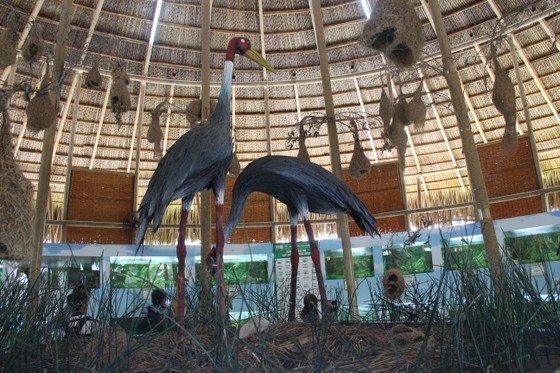The Mekong Delta Province of Dong Thap signed a cooperation agreement with experts to conserve the population of red-crowned cranes.

House displaying a model of red-headed crane at Tram Chim National Park
Today, the People's Committee of Dong Thap province signed a memorandum of understanding with the International Crane Association and the Vietnam Zoo Association to conserve the population of red-crowned cranes in Tram Chim National Park.
Experts are committed to the implementation of the red-crowned Crane rehabilitation program as well as a long-term roadmap for the conservation of red-crowned cranes, an endangered bird species listed in the International Union for Conservation of Nature (IUCN)’s Red List of Threatened Species spotted at Dong Thap Province’s Tram Chim National Park.
The content of the signing includes the transfer of red-crowned crane cubs in captivity from Thailand to Vietnam, staff training, development of captivity facilities, the release and monitoring of red-crowned cranes, and management of the crane's habitat in the core and buffer zones of Tram Chim National Park.
The Tram Chim National Park is one of the important places for red-crowned cranes in Vietnam. However, recently, the number of birds in the latter area has been falling every year because of a decline in the density of cajuput forests and food sources, illegal entry by people into the bird reproduction area, and bad weather, the National Park’s endangered birds need protection. This species is listed as endangered on the Red List of Endangered Species of the International Union for Conservation of Nature (IUCN).
At the signing ceremony, Vice Chairman of Dong Thap Provincial People's Committee Nguyen Phuoc Thien thanked the International Crane Association, the Vietnam Zoo Association and experts that provided support to the province in the conservation of the rare birds.
Mr. Nguyen Phuoc Thien emphasized that the development of tourism associated with the red-crowned crane conservation program in the Tram Chim National Park is being considered to restore the ecosystem for local socio-economic growth.
By Phan Huy – Translated By Anh Quan